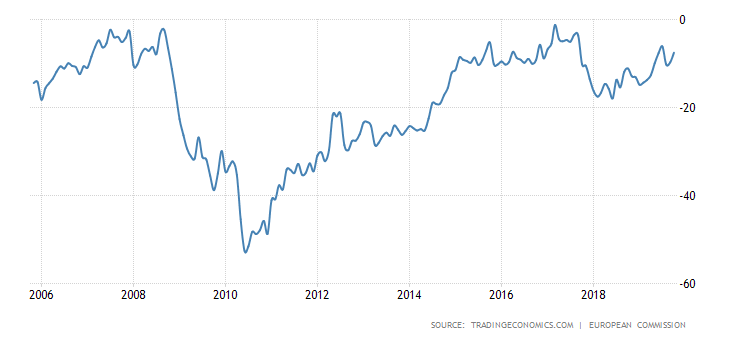One of the “compelling” arguments that those who refute the danger of the economy slowing down and sliding towards recession put forward is the Romanian consumers` appetite which shows no sign of abating. And why would it while consumer sentiment is still running high as the graph below illustrates.

Look harder however, and a gloomier picture appears. Consumer sentiment remains in fact positive up to the edge of a crisis and even a while into the crisis. This is what the shifts in the graph above suggest happened in the run-up to the crisis which broke out in 2007. Please note, in 2007, as the subprime mortgage crisis in the US was making headlines, the American financial system was shaking and financial institutions, such as Bear Stearns, Fannie Mae and Freddie Mac, Merrill Lynch had to be bailed out throughout 2008 with public or private money. It was not the case with Lehman Brothers which was allowed to fail in September 2008, when consumer confidence in Romania was at its highest.
Clearly, opinion leaders` influence cannot be ignored. The entire time they consistently supported the idea that Romania was sheltered from any peril and that “Romanians have nothing to be afraid of”. Given that despite their supposed level of sophistication and knowledge the impact of the crisis on the country was underestimated to such an extent, it should be little wonder that the public retained confidence even as the major US and European financial institutions were getting into serious trouble. The rise in their wages felt in their pockets was prevailing…
This is exactly the picture that we are seeing now. The significant wage and pension increases that many Romanians have seen over the last years, many achieved by public borrowing, continue to translate into purchasing power and consumer confidence. The confidence will start to dwindle only with the first layoffs and wage cuts, at a moment, that is, which may be too late for companies to adapt.
The situation presents businesses in Romania and elsewhere with the same conundrum that investors in capital markets have to deal with. How do you act when you become aware that you are in a market which is “too good to be true”: do you follow the “herd” and continue to invest or go against the tide? This is not a decision readily taken because nobody has a crystal ball with the start date of a recession. The choice in these circumstances is to enjoy the few extra growth percentages that a protracted growth has still to offer and run the risk of a belated management decision with all the losses attached.
Statistics suggest that some financial investors and businesses are starting to tread cautiously as they foresee a trend reversal. They sit on their cash longer and put an end to investments. A recent report by economist Iancu Guda shows that the largest 1,000 companies in Romania holding 50% of overall business revenue saw the lowest profit margins in a decade and use their cash flows to repay debt and sit on 80% of all Romanian companies cash. A prudent approach at the end of a cycle, despite a still high consumer sentiment.
And what is even worse for businesses, it is highly probable that, should a an shock occur, consumer sentiment will act like a pendulum and go from the frenzied behavior before the shock to the other extreme and compound the effects. Any economic shock, an external one, for example, will unavoidably adversely impact the financial situation of the population: public and private sector unemployment will rise, wages will freeze or even drop, employee perks will be cancelled and so on. This will definitely trigger a psychological reaction also in those who may not bear the brunt of the crisis but see how a part of their relatives, friends or neighbors lose their job or even find it difficult to pay bills and loans.
It will be a context that changes sentiment and behavior over the long term. It will only worsen the economic downturn and make a way-out by dampening consumption more challenging. Going back to the graph above, we can see how it took seven years to regain consumer confidence lost in just two.
The graph hints at another interesting fact, namely that there are non-economic developments out there which can sway consumer sentiment even in a more benign economic environment. Look at the sentiment dip in early September 2018 which continued through early 2019. It was a very hectic political and social background which culminated towards the end of 2018 in a series of economic decisions, questionable to say the least, enforced by executive order. On the face of it, they did not leave deep marks on confidence of the Romanian consumer.
But does that mean that, conversely, economically ungrounded upbeat comments are to be relied on to maintain consumer confidence? Economically speaking, it might help in the short term, but morally it would be shameful. The more unprepared, misinformed about the recession the public is, the harsher the blow.
So, dear leaders, the Romanian economy is slowing down and the industry is already in recession. I recommend honesty and realism.



